Related Research Articles
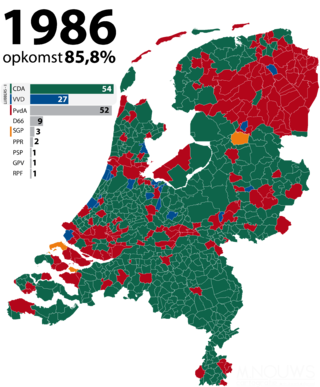
General elections were held in the Netherlands on 21 May 1986. The Christian Democratic Appeal (CDA) emerged as the largest party, winning 54 of the 150 seats in the House of Representatives.

Alexander Van der Bellen is the current president of Austria. He previously served as a professor of economics at the University of Vienna, and after joining politics, as the spokesman of the Austrian Green Party.
Henning Meyer is a German social scientist, consultant and policy specialist. He is the first Fellow of the German Federal Ministry of Finance and honorary professor for Public Policy and Business at the Eberhard Karls University of Tübingen. Furthermore, he is research associate at Cambridge University’s Centre for Business Research (CBR), Future World Fellow at the Centre for the Governance of Change at IE University and founder and editor-in-chief of Social Europe. Previously, he was John F. Kennedy Memorial Fellow at the Minda de Gunzburg Center for European Studies at Harvard University, senior visiting fellow and research associate at the London School of Economics and Political Science and visiting fellow at Cornell University.
Stanley Hoffmann was a French political scientist and the Paul and Catherine Buttenwieser University Professor at Harvard University, specializing in French politics and society, European politics, U.S. foreign policy, and international relations.
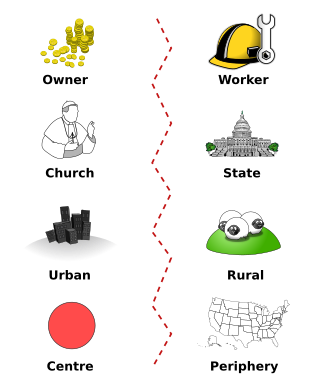
In political science and sociology, a cleavage is a historically determined social or cultural line which divides citizens within a society into groups with differing political interests, resulting in political conflict among these groups. Social or cultural cleavages thus become political cleavages once they get politicized as such. Cleavage theory accordingly argues that political cleavages predominantly determine a country's party system as well as the individual voting behavior of citizens, dividing them into voting blocs. It is distinct from other common political theories on voting behavior in the sense that it focuses on aggregate and structural patterns instead of individual voting behaviors.
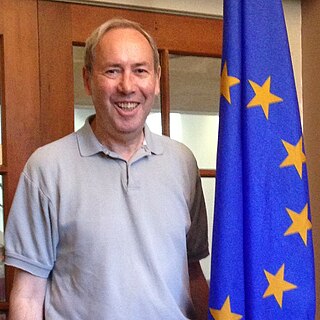
David Gordon Blackbourn is Cornelius Vanderbilt distinguished chair of history at Vanderbilt University, where he teaches modern German and European history. Prior to arriving at Vanderbilt, Blackbourn was Coolidge Professor of history at Harvard University.
Derek Jonathan Penslar, is an American-Canadian comparative historian with interests in the relationship between modern Israel and diaspora Jewish societies, global nationalist movements, European colonialism, and post-colonial states.
Andrew Alexander Michta is an American political scientist and Dean of the College of International and Security Studies at the George C. Marshall European Center for Security Studies in Germany. Previously he was Professor of National Security Affairs at the US Naval War College. He was also an affiliate of the Minda de Gunzburg Center for European Studies, an Adjunct Fellow at the Center for Strategic and International Studies – Europe Program in Washington, DC, and an adjunct political scientist at the RAND Corporation.
Centre for European Studies is the name of several organisations involved in the field of European studies:
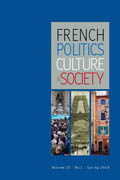
French Politics, Culture & Society is a peer-reviewed academic journal published by Berghahn Books on behalf of the Conference Group on French Politics & Society. It covers modern and contemporary France from the perspectives of the social sciences, history, and cultural analysis. It also explores the relationship of France to the rest of the world, especially Europe, the United States, and the former French colonies. The editor-in-chief is Herrick Chapman.

The Real Colegio Complutense at Harvard University, US: The RCC at Harvard is an academic institution aimed at providing intellectual exchange between Harvard and the Spanish Academia. It is located at 26 Trowbridge Street, Cambridge (MA).
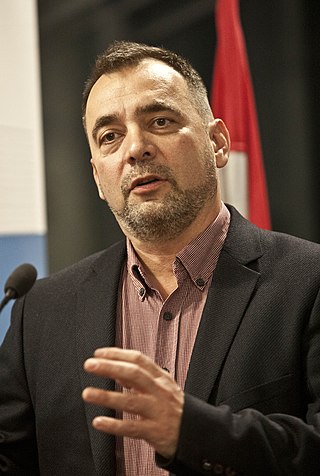
Tamás Meszerics is a Hungarian politician and Member of the European Parliament (MEP) from Hungary. He was elected as a member of the Politics Can Be Different, part of the European Green Party in 2014. He joined The Greens–European Free Alliance group.

Christiane Lemke is a German politician and professor of political science. She holds the chair in international relations and European studies at Leibniz University Hannover. In 1991–1992, she was a Visiting Krupp Chair in the department of government at Harvard University and from 2010 to 2014 she held the Max Weber Chair at New York University. She is currently also a visiting professor at the University of North Carolina at Chapel Hill.
Georgina Nicola Alexandra Waylen, is a British political scientist, specialising in comparative politics, political economy, and gender and politics. Since April 2012, she has been Professor of Politics at the University of Manchester. She previously taught at the University of Sheffield, the University of Salford and the University of East Anglia. She was a visiting scholar at the Minda de Gunzburg Center for European Studies, Harvard University from 2016 to 2017, and has been a visiting professor in the Department of Gender Studies at the London School of Economics since 2018.
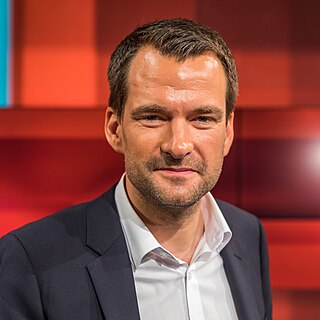
Johannes Vogel is a German politician of the Free Democratic Party (FDP) who has served as a member of the Bundestag from the state of North Rhine-Westphalia from 2009 until 2013 and since 2017.
Guido Goldman was a Swiss-born American academic and philanthropist known for advancing post–World War II US-Germany academic and cultural relations. He was a co-founder of the German Marshall Fund and also set up the Center for European Studies at Harvard University.

Elections to the European Parliament saw declining voter turnout between 1979 and 2014. However, voter turnout in 2019 European elections increased by 8 points compared to 2014. In spite of this exception for all Member States, the electoral mobilization remains weak compared to the national parliamentary elections. Moreover, turnout significantly differs from one country to another in Europe and across a time: in 2019 Belgium citizens participated the most with 88.47% and Slovakians the less with 22.74%. The potential factors that might influence these trends and their implications have attracted great scholarly attention. Identifying and analysing the factors that determine the relative low turnout at European elections is therefore critical, as it is one element that weakens the democratic legitimacy of the European Parliament.
Jocelyne Cesari is a French political scientist and Islamic studies scholar who is tenured at the French National Center for Scientific Research in Paris. Her works focus on religion and international relations, Islam and globalization, Islam and secularism, immigration, and religious pluralism.
Cees van der Eijk is a Dutch political scientist, a Corresponding Member of the Royal Netherlands Academy of Arts and Sciences (KNAW), and a Honorary Fellow of the Amsterdam School of Communication Research, University of Amsterdam. He is Professor of Social Science Research Methods at the University of Nottingham. He was Professor of Political Science at the University of Amsterdam until 2004. Van der Eijk sits on the Research Advisory Board of the Committee on Standards in Public Life.
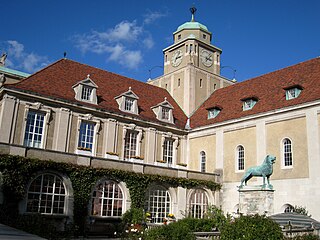
The Minda de Gunzburg Center for European Studies (CES) is a center at Harvard University dedicated to the study, understanding, and promotion of European affairs and transatlantic relations. Founded in 1969, the center has fostered interdisciplinary scholarship, focusing on the intricate social, political, historical, and cultural dimensions of Europe. It has hosted notable political and scholarly personalities, established partnerships with institutions worldwide, hosted dozens of visiting researchers, and run programs, seminars, events, and issued publications.
References
- ↑ "Mark Franklin". Minda de Gunzburg Center for European Studies at Harvard University.
- ↑ "Mark N Franklin". Trinity College. Retrieved 2023-01-08.